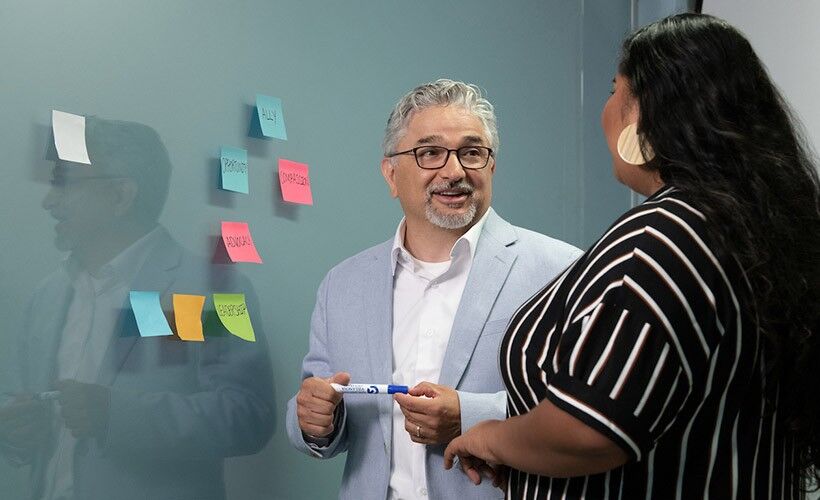Comm. Dept. DEI Initiative Reflects Focus on Social Justice
Courtesy of Villanova University
Professors collaborate on DEI courses in the College of Liberal Arts and Sciences.
September 16, 2021
As part of a renewed departmental initiative centered around diversity, equity and inclusion, the University’s Department of Communication recently introduced a slew of new courses pointed toward revealing, discussing and addressing systemic inequities, as well as a new Antiracism, Equity and Inclusion (AREI) course requirement within the major.
This effort is part of an ongoing push within the department and across the University to better prioritize issues of racial discrimination and social injustice in other forms.
The new courses, some of which are already being offered this semester, will explore these issues in a variety of contexts across the discipline, with concentrations in rhetoric, performance and media studies, among others. Particular offerings include “Rhetorics of Hate and Free Speech,” “Rhetorics of Race” and “Performance and Intersectionality,” to name a few.
Heidi Rose, Ph.D., chair of the Department of Communication, expanded on the inspiration behind the new additions to the curriculum.
“Overall, this department and our faculty have a commitment to looking at communication as a part of social and racial justice,” Rose explained. “It has always been at the core of our teaching and, for many of us, our own research.”
Rose and the Communication faculty recognize the unique role of their discipline in issues of inequity and discrimination, both as a contributing factor and as a possible tool in progress. They aim for the new courses and departmental focus to raise awareness of these ideas on campus.
“We are committed to courses that look at how communication itself has constituted or contributed to systemic inequities and how, by bringing that to light, how the discipline can make positive change,” Rose said.
To achieve that two-pronged goal, these courses will first approach DEI from a general historical context, understanding that communication as an academic discipline has compounded societal oppression, while also keeping in mind the present context: Villanova University in 2021. Moving from this foundation, the classes will encourage students to take action and engage in conversation.
Rose emphasized the importance of dialogue as a key factor both in communication generally and in addressing injustice in particular.
She outlined “true dialogue” as listening to and engaging with others without judgement while acknowledging personal biases and highlighted it as a major objective in the department’s initiative.
This goal of encouraging dialogue on campus, Rose argued, has particular significance considering the University’s position as a predominantly white institution.
“There are a lot of white students who profoundly want to be engaged and work to make change but might feel stifled or nervous in this space because they don’t want to be wrong or different,” Rose said.
She added that these courses should serve as opportunities to start the hard but necessary conversations in a safe space to encourage the same dialogue on a greater scale outside the classroom.
This department-specific initiative comes in the midst of similar action being taken by the University put forth by the July 2020 Aequitas Presidential Task Force on Race. Specifically, University administrators recently announced the addition of a new University Race and Justice Course to the core curriculum across colleges.
Additionally, recent semesters have seen heightened focus on the University’s Intergroup Relations (IGR) program, housed within the Office of Diversity, Equity and Inclusion, through which students can take one-credit courses focused on dialogue as a way to come to mutual understanding. Topics of these courses include race, gender, religion/faith, socioeconomic status, sexual orientation and ability.
With this particular effort, the Department of Communication aims to complement and support these University-wide initiatives without simply replicating them, Rose explained.
Sophomore Communication major Anna Baldwin described the importance of this focus on DEI within the major and across the University.
“I think it’s important to have conversations and understand these topics that might be uncomfortable at first, and Communication is the perfect area to approach them from,” Baldwin said.
This effort is ongoing, and new courses will continue to be developed within the major as faculty members find new ways to integrate social justice and awareness into the Communication curriculum.








